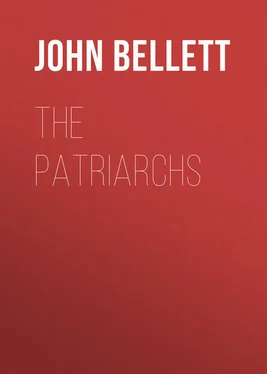John Bellett - The Patriarchs
Здесь есть возможность читать онлайн «John Bellett - The Patriarchs» — ознакомительный отрывок электронной книги совершенно бесплатно, а после прочтения отрывка купить полную версию. В некоторых случаях можно слушать аудио, скачать через торрент в формате fb2 и присутствует краткое содержание. Жанр: foreign_antique, foreign_prose, Биографии и Мемуары, на английском языке. Описание произведения, (предисловие) а так же отзывы посетителей доступны на портале библиотеки ЛибКат.
- Название:The Patriarchs
- Автор:
- Жанр:
- Год:неизвестен
- ISBN:нет данных
- Рейтинг книги:4 / 5. Голосов: 1
-
Избранное:Добавить в избранное
- Отзывы:
-
Ваша оценка:
- 80
- 1
- 2
- 3
- 4
- 5
The Patriarchs: краткое содержание, описание и аннотация
Предлагаем к чтению аннотацию, описание, краткое содержание или предисловие (зависит от того, что написал сам автор книги «The Patriarchs»). Если вы не нашли необходимую информацию о книге — напишите в комментариях, мы постараемся отыскать её.
The Patriarchs — читать онлайн ознакомительный отрывок
Ниже представлен текст книги, разбитый по страницам. Система сохранения места последней прочитанной страницы, позволяет с удобством читать онлайн бесплатно книгу «The Patriarchs», без необходимости каждый раз заново искать на чём Вы остановились. Поставьте закладку, и сможете в любой момент перейти на страницу, на которой закончили чтение.
Интервал:
Закладка:
The lesson taught us may be the profoundest in the mind of the Spirit, but the school where it is learnt may be a despised place. Look, for instance, at Genesis xlviii. You are there at the bedside of a dying old man-a common homely spot. But there, some of the deepest and richest secrets of the mind of God are, in a figure, conveyed to us-the great mystery of our adoption, according to divine good pleasure; and then our welcome into the family of God, in the day of our manifestation, or conversion. And what richer counsels of grace are there than those? And yet in what more common or homely school could they have been taught us?
As in still earlier days, in Genesis xvi. There you are introduced to the domestic arrangement of Abraham's family as to the servant and her mistress, and their disputes; and yet, in all that, you get the profound mystery of the two covenants. Gal. iv. And again, in the act, the ordinary act, of discharging a servant, another feature in the same mystery is presented to us, in chapter xxi. The wisdom of God delights in these scenes and materials; they rebuke the erring thought of man's heart, that important things must be done or said by imposing methods-that the prophet must come forth and strike his hand over the place. 2 Kings v. 11. But it is with rude and inartificial instruments that both the wisdom of God and the power of God are commonly seen. Rams' horns blew down Jericho, and fishermen turned the world upside down, as was said of them. But these homely methods of God's wisdom aid in carrying the instruction home, and lodging it deep in the intimacies and recollections of the heart. I may therefore still say that Noah's ship had no pump in it. Indeed it could not. Such a thing would have witnessed against it. God's provisions would have declared their own insufficiency. That could never have been. God's provisions and God's works always tell whose they are by being what they are. Simplicity, and yet sufficiency, give them their character. "Let there be light, and there was light." "Believe in the Lord Jesus Christ, and thou shalt be saved;" and the sinner, believing, rejoiced in God with all his house.
So, in like simplicity, in these earlier days. The heart of Noah was not soiled by a suspicion. He rested in the sea-worthiness of his vessel, because of God's appointment and approval of it-nay, I may say, because of God's building of it. Faith keeping his heart quiet and assured as to the judgment, hope fills it as to the coming glory.
Such is the beautiful way of this "prisoner of hope." A prisoner of hope is one of the Spirit's titles, I may say, for all the saints of God. Jeremiah was such an one in his day. Jeremiah was shut up in "the court of the prison, which was in the king of Judah's house," and this, too, for Christ's sake. He was God's prisoner, and such an one is always hope's prisoner. Jeremiah is told to purchase Hananiah's field, and that was food for hope, like the olive-leaf in the mouth of the dove. It told the prophet of good days to come, though at that moment he was in a prison, the Chaldean army at the city gates, and all the land deserted. The waters were again all around and abroad; but the ark of the prophet, like that of the patriarch, had a window in it.
So was Israel a prisoner of hope in the night of the passover. With shoe on foot, staff in hand, and girded loins, Israel waited in the very midst of the judgments of the Lord; but, like our patriarch, they waited there only to pass out to the inheritance of the Lord. And having the pre-eminence in all things, Jesus again and again shows us the perfect way of a prisoner of hope, looking for a resurrection portion. As when He entered Jerusalem, in John xii., the Jewish multitudes and the Gentile strangers being drawn thither to inquire after Him, and all the dignities and joys of the Son of David seeming to wait on Him, His heart waits on the resurrection hope still, "the joy set before him," and forth from that attitude of soul, or place of expectation, He speaks of the corn of wheat falling into the ground and dying. Steadily and desirously did His eye rest on the glory which lay, not in that hour, but beyond it. In a spirit of entire consecration and sacrifice, He surrenders that hour (bright to Him in the world as it was, and big with the promise of all its kingdoms and the glory thereof) to the Father: and the voice from heaven then visits this perfect, blessed "prisoner of hope," with assurances that, in due season, even resurrection times, His name and victory and honour should all be provided for and secured.
Matchless Jesus! – This voice from heaven was again the food of hope's prisoner. And what was the transfiguration on the holy hill but the same? Jesus had been speaking to the disciples of His death, and encouraging them (as He would us, beloved) not to love their lives in this world, when, soon after, six or eight days, as we read, the holy hill shines suddenly with the light of resurrection or millennial regions. And what was all that visitation of glory, but the grapes of Eshcol brought from Canaan to the camp of God in the desert; or as the return of the dove to Noah, with the olive-leaf in her mouth?
The time, however, for "rendering double" to this "prisoner of hope" (Zech. ix. 12), comes in due course. "And God spake unto Noah, saying, Go forth of the ark, thou, and thy wife, and thy sons, and thy sons' wives with thee! bring forth with thee every living thing that is with thee, of all flesh, both of fowl and of cattle, and of every creeping thing that creepeth upon the earth." And Noah went forth. He landed on the renewed earth, where, at that mystic moment, all was, in a great sense, according to God's mind again; no longer corrupt, as when he had last trod it in its old estate, but clean, under the refining of the judgment.
Not a thing had gone into the ark thirteen months before, which did not now come forth. The small and the great had been in it, and the small were as safe as the great; the creeping thing of the ditch or the hedge, as free of all danger or harm as Noah himself. Precious mystery! We may be little, and we are little, as the heart knows full well; but heaven, or the coming system of glory, has fitted itself like the ark, for the receiving of the small as well as the great. "A voice came out of the throne, saying, Praise our God, all ye His servants, and ye that fear Him, both small and great." We may be calm, though we know ourselves to be "small" in every way, even as the creeping thing that went in with Noah-for such a little one was equally in the covenant, or "the family settlement," which made each and all, in their way and measure, inheritors of the new world. The Father's house on high has surely made its reckoning according to these differences of "small and great." As in ancient days of typical glory, all the congregation of Israel, the distant ones of Dan and Naphtali, as well as the princes of Judah, joined in the shout of triumph when the fire came down, and in mystery, the kingdom was entered. Lev. ix. Clement and others were not Paul in the measure of their labours, or in the energy of the Spirit; but they were Paul as having their names, alike with his, in the book of life. Phil. iv. 3. The Father has built His house in the heavens, on the very plan of its receiving the saints as well as Jesus Himself. It was part of the original design. Ere foundations were laid, that plan and purpose were laid. In counsels of everlasting love it was provided that the house should be a large one, a many-roomed or mansioned house, that all the children might be there.
What say we, beloved? Do our thoughts of it and glances at it do justice to this love of God? As well might you say, your prospect from the highest of the hills could do justice to God's creation. Could your glance then measure the ten thousandth part of the earth? The length, the depth, the breadth, the height-the love of Christ which passeth knowledge!
Читать дальшеИнтервал:
Закладка:
Похожие книги на «The Patriarchs»
Представляем Вашему вниманию похожие книги на «The Patriarchs» списком для выбора. Мы отобрали схожую по названию и смыслу литературу в надежде предоставить читателям больше вариантов отыскать новые, интересные, ещё непрочитанные произведения.
Обсуждение, отзывы о книге «The Patriarchs» и просто собственные мнения читателей. Оставьте ваши комментарии, напишите, что Вы думаете о произведении, его смысле или главных героях. Укажите что конкретно понравилось, а что нет, и почему Вы так считаете.












